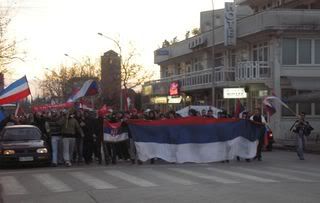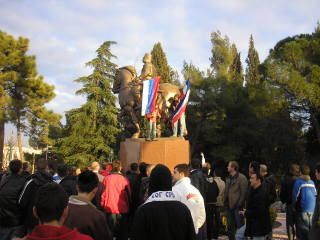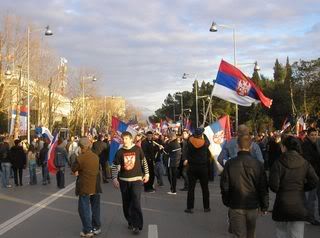Demonstrations in Podgorica

Yesterday evening (Friday February 22) protesters filled the streets of Podgorica to denounce the independence of Kosovo from Serbia. Hoisting Serbian flags and chanting pro-Serbian slogans, demonstrators filed from all corners of the city to assemble downtown and voice their frustrations. Although, thankfully, the demonstrations did not turn violent (as in nearby Belgrade) it was certainly the largest gathering of any kind I have witnessed in Montenegro, and it was apparent that people's sentiments here are strongly against Kosovan independence.

Of course, the irony was not lost on me that, only two years ago (if that) Montenegro obtained its own independence from Serbia. Although the vote for Montenegrin independence was quite narrow (just over 55% in favor) it was not strongly contested and, today, Montenegro enjoys its status of an independent state. Why, then, should Montenegrins wish to deny Kosovo the same right?

Surely, a great deal of this has to do with the fact that many people here in Montenegro still consider themselves Serbian. They feel a great sense of patriotism for their fatherland even though they live here in Montenegro today. Many of these people are able to concede that Montenegro has a distinguished history of independent status from Serbia, and simply found themselves living in this "foreign land" after the collapse of Yugoslavia and the subsequent independence of Montenegro. Unlike Montenegro, however, they reckon that Kosovo is and always has been a part of Serbia and thus should not be split from it.

There is also an intense hatred of Albanians in Serbia and Montenegro, which most of the population of Kosovo - and certainly those Kosovans who wanted independence - are. In the minds of many Serbians and Montenegrins, Albanians are bent on expanding their nation into Serbian and Montenegrin borders (a paranoia left behind from the days of the Ottoman Empire perhaps) and they conceive those Albanians living in their countries to be the avant guard of a greater occupying force. For Albanian Kosovans to announce their independence from Serbia only confirms their worst fears.
So why are these Albanians in Kosovo, if Kosovo is traditionally Serbia? During the days of Yugoslavia, Tito allowed a number of Albanian refugees into Kosovo. Subsequently, according to the Montenegrin sentiment, these Albanians invited all of their relatives (who were inexplicably rich) to move into Kosovo and buy up all the land. Also, so the racist rhetoric goes, Albanians are want to have more babies than Serbians. ("Breeding like animals" you can almost hear.) Thus, in short time, Kosovo became dominated by people of Albanian ethnicity.

In the minds of many Montenegrin Serbs, then, Kosovo has been stolen by these Albanian refugees. For foreign nations such as the USA and the UK to support - even encourage - Kosovan independence is, for them, to be complicit with thievery. It is little wonder, then, why Serbians are angry with both Albanian Kosovans and the West.

So what is the answer? Should Serbia deny Kosovo its independence, or should Serbia suck up this insult ("This is what you get for your Milosevic years, Serbia") and embrace those who would scoff its sovereignty as a member of the EU? Should Albanian Kosovans continue to live as third-rate citizens in Serbia, a stigma forever on their heads, or should they instead demand to live as they would live in their own homes, as citizens of their own nation separate from those who would do them harm?
Ultimately, the question comes down to democracy versus national sovereignty. If you embrace democracy, if you believe that a people should be free to decide their own fates and be governed by their own laws wherever they may live, then Kosovo should be free. This is what the great majority of the people want there,and to deny them this is to deny them any basic rights of self-governance. However, if you believe that a nation has the right to defend its own borders and maintain its own sovereignty, even from those living within its borders (and perhaps especially if these people have been compassionately granted refugee status by this nation) then Kosovo should remain part of Serbia, and those Albanian Serbs living there should submit themselves to the law of the land. There is no easy answer.
What is perhaps more difficult is the precedent Kosovo's independence sets for the future. Should the Tamil Tigers also be able to declare the independence of northern Sri Lanka, despite the fact that they are widely accepted as militant invaders? Would the Tibetan government in exile be within its rights to demand the independence of McLeod Ganj from India? And what of those nations where there is a separatist sentiment from peoples who are regarded as ethnic nationals within their countries? How soon will it be before referendums for independence are held by the Caucasian Chechins in Russia, the Basque in Spain, or the Kurds in Eastern Turkey? Mustn't the US and those nations that recognized Kosovan independence recognize the independence of these regions as well, lest they be labeled hypocrites? Indeed, shouldn't the US encourage the dissolution of Iraq into three, ethnically and religiously defined zones (just as it encourages the separation of Kosovo) instead of trying to hold Iraq together?
The future of national sovereignty is in jeopardy. Yet, perhaps, this is a natural and welcome consequence of democracy. Nations have always shifted and changed their borders due to wars, treaties, and the movement of peoples throughout history. It is conceivable that national sovereignty is itself a misplaced notion that stands in the face of the natural consequences of humanity. Isn't it better, then, for the borders of nations to change as a result of the fair and free choices of the people living in an area, rather than as a result of war, conquest, or genocide?
Kosovans have made their choice. Let the world accept this choice, and the consequences that Kosovo has for the future. People must come before nations.

0 Comments:
Post a Comment
<< Home